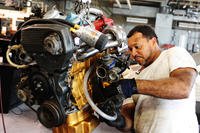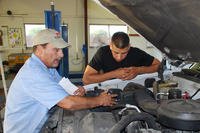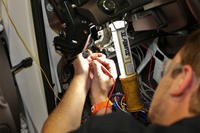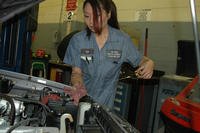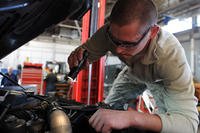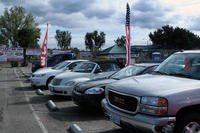A can of inflator/sealant: This item saves you the trouble — and possible danger — of changing a flat on the road. It attaches easily to the valve stem on your flat tire and inflates the tire with goop that temporarily seals the puncture. Choose a brand that enables you to drive at least 50 miles — that should get you to a repair shop. Be sure to tell them that you used inflator/sealant and ask them to remove it when they fix the flat.
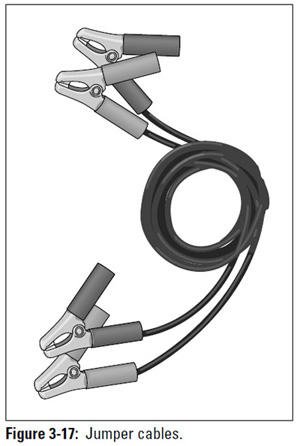
Jumper cables: One of the most common automotive malfunctions is the loss of power to start the engine, either from an old or faulty battery or from leaving the headlights on by mistake. If you're in this situation, and if your owner's manual indicates that you can jump a start without harming your onboard computer, you can wait for AAA or CAA roadside assistance (if you're a member) or a nearby garage to come and bail you out; or, if you're in a safe, wellpopulated area, you can stop a passing vehicle, whip out your jumper cables (shown in Figure 3-17), attach them in seconds, and "jump a start" from the Good Samaritan's vehicle to your own. Many people are willing to lend their cars to this sort of operation because they lose nothing but a few minutes of their time, but it's up to you to decide whether you want to risk getting carjacked if the Good Samaritan turns out to be a devil in disguise. Your alternative, of course, is to use your cellphone to call roadside assistance or the highway patrol to send help.
You can buy a set of jumper cables for much less than you'd have to pay a garage to send someone to start your car. Good cables cost more because they have more strands of better-conducting wire, which let more juice flow between the vehicles with less loss of voltage.
Sometimes the success or failure of an attempt to jump a start depends on the quality of the jumper cables and their grips. If you get a cheap set, here's an easy way to make them work better: Get under the plastic sheath that covers the place where the cables meet the grips and squeeze the connection tight with pliers. Doing so improves the connection, and sometimes the cheap set of cables works beautifully — at least for the first few times. Ultimately, the best way to stay out of trouble is to pay a little extra for a quality set of cables.
Snow and ice equipment: If you live in an area that's cold in winter, carry tire chains or a bag of sand in case of icy conditions. (Rock salt is no longer used for this purpose because it corrodes metal and is considered an environmental hazard.) A small shovel also may prove useful for digging your tires out, and a scraper allows you to clear your windshield of snow and/or ice. A can of de-icer is useful in icy weather.
Flashlights and reflectors: A flashlight in your glove compartment can help your kids locate dropped toys on the floor of the car, enable you to see under the hood if your vehicle breaks down, and serve as an emergency light for oncoming traffic if you have to stop on the road for repairs. (A flashlight with a red blinker is safest for the last purpose.) Of course, you have to put in fresh batteries now and then and carry a couple of extras.
An inexpensive set of reflector triangles can save your life by making your stopped vehicle visible on the road. Flares can be dangerous, and many states have rules regarding their use on highways.
First-aid kit: Keep a first-aid kit in your workshop and in your vehicle. Choose one that's equipped with a variety of bandages, tweezers, surgical tape, antibiotic ointment, something soothing for burns, and a good antiseptic. You can find inexpensive kits at drugstores and auto parts stores.
Hand cleaner: Most hand cleaners are basically grease solvents. They range from heavy-duty stuff that removes the skin along with the grease, to soothing, good-smelling creams that leave your skin feeling reborn, to precleaners that you use before you start working so that the grease slides off your hands easily afterward. Some of these cleaners can also be rubbed into work clothes to remove grease and oil stains before you launder them.
Gloves: Keep a pair of gloves in the vehicle for emergencies. Industrial rubber gloves, available at swimming pool supply stores, aren't affected by gasoline, solvent, or battery acid. They're your safest bet. Thin, tough, and comfortable dishwashing gloves are available at any discount store or supermarket. They cost little and keep the grease from under your fingernails. One problem, however, is that gasoline or solvent may melt them.
Spare tools: If you can't carry your toolbox in your vehicle all the time, or if it's too large or too heavy to waste fuel toting around, place a couple of screwdrivers, some standard-size combination wrenches, an adjustable wrench, and a can of penetrating oil in a lightweight toolbox in your trunk compartment.
Auto parts stores carry some very handy gizmos that combine a variety of basic tools into one all-purpose, weird-looking instrument that can save weight and space in your trunk compartment.
Hat: To keep the dust and grease out of your hair, and to prevent long hair from being caught in moving parts, wear a hat that you can afford to get dirty. A wooly watch cap or a baseball hat worn backwards works just fine. At the very least, keep a hair band in the glove compartment to tie back your hair. In this case, safety trumps vanity.
Cellphone: A cellphone literally can be a lifesaver when you're stuck on a road somewhere with a dead vehicle or when you have an accident. It enables you to call for help without having to rely on the kindness of strangers. (It's also handy for calling your loved ones or next appointment to tell them that you're going to be delayed.) Some cellphones have built-in AAA roadside assistance or 911 call buttons.
Miscellaneous stuff: Rolls of duct tape and electrician's tape, a sharp knife, and scissors come in handy. A disposable camera lets you collect evidence for insurance claims if you're involved in an accident. Keep a pen, a small pad, and some extra change on hand for parking meters or pay phones.
From Auto Repair for Dummies, copyright © 2009 by Wiley Publishing, Inc., Indianapolis, Indiana. Used by arrangement with John Wiley & Sons, Inc.





